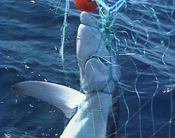Sharks on Deck: December Brings Shark Conservation Decisions within Europe and Globally

This month, the Shark Alliance is welcoming a suite of opportunities to secure a brighter future for beleaguered shark species, particularly those within Europe. Through deliberation of EU proposals and overlapping international discussion of global action, these exceptionally vulnerable animals are at last getting some long overdue attention.
In particular, the Shark Alliance is participating in debates regarding new EU catch limits, an EU Plan of Action for shark conservation, new global shark agreements under the Convention on Migratory Species, and shark directives from the United Nations General Assembly. The Shark Alliance will offer additional comment on all of these key events, as developments unfold.
PROPOSALS TO LIMIT EU SHARK FISHING IN 2008
Last week, the European Commission released its proposals for 2008 total allowable catch (TAC) limits for fished species, including spurdog (spiny dogfish), porbeagle sharks, and a variety of skates and rays.
The TACs proposed by the Commission cover only a few of the scores of European shark and ray species taken in fisheries and are much higher than scientists advise. In particular, the International Council for Exploration of the Sea (ICES) has recommended no fishing and minimization of incidental catch of spurdog and porbeagle sharks, both considered Critically Endangered by the IUCN. The Commission has instead proposed a modest 25% reduction in spurdog catch and a barely restrictive 422 metric ton limit on porbeagle sharks, nearly twice the level proposed last year and rejected by the Council. The Commission has also recommended a 25% reduction in the North Sea TAC for skates and rays (close relatives of sharks), but fisheries for these species in adjacent waters remain largely unregulated.
“Whereas we welcome reduction in spurdog catches and remain hopeful that the critically endangered porbeagle shark will at last soon be limited, such small steps are not sufficient to stem the alarming declines in these exceptionally vulnerable shark populations,” remarked Sonja Fordham, Shark Alliance Policy Director. “It is now up the Council of Ministers to reduce these proposed catch limits to better reflect the scientific advice and provide hope for recovery of these long-neglected species.”
AN EU PLAN OF ACTION FOR THE CONSERVATION OF SHARKS
Eight years after a pledge to do so, the European Commission is at last on the verge of revealing a stakeholder consultation paper on the Community Plan of Action (CPOA) for Sharks. This pivotal proposal marks a key first step toward establishing an EU-wide programme for shark conservation. Having campaigned for a sound CPOA for years, Shark Alliance member groups are eagerly awaiting the release consultation document, expected early this week.
A strong proposal, that outlines a clear path to sound limits shark fishing, endangered species protection, and a stronger finning ban, could signal a new era of responsible shark conservation in the EU. A weak paper, simply listing the meagre measures that currently exist without commitment to action, stands to secure the EU a place among the world's poorest protectors of sharks and will leave many species at risk of extinction.
“This first outline will be telling in terms of the Commission's commitment to shark conservation. Considering the years of delay and resulting crisis for European shark and ray species, there is scant excuse for not engaging seriously in this urgent conservation challenge,” said Uta Bellion, Director of the Shark Alliance.
The consultation paper should lead to an official Communication to the Council of Ministers and European Parliament before the end of 2008, after which both entities will offer their views.
UNITED NATIONS GENERAL ASSEMBLY RESOLUTION, 10 December
During the week of December 10th, the United Nations General Assembly will adopt its annual Fisheries Resolution, which is expected to include ground-breaking language aimed at strengthening protections for sharks. Draft text, agreed in November, calls on fishing nations and international fisheries organizations to urgently adopt science based measures, such as limits on shark catch and fishing effort, and to take immediate and concerted action to improve implementation of existing shark measures, including finning bans. The draft Resolution encourages additional measures, in particular, requirements that sharks be landed with their fins attached, the strategy recommended by scientists for optimal effectiveness and data collection.
“The EU's current shark finning ban is among the weakest in the world,” noted Bellion. “By simply adopting the fins-attached policy encouraged by the United Nations, the EU could take its shark finning ban from lagging to leading.”
GLOBAL OPTIONS THROUGH CONVENTION ON MIGRATORY SPECIES, 11–13 December
The Convention on Migratory Species (CMS) is convening a special meeting of member and cooperating Parties, fisheries bodies, and NGOs in the Seychelles to consider new agreements for improving international conservation of migratory sharks.
“Despite the inherent vulnerability, widespread decline, and increased fishing pressure associated with sharks, there are still no international limits on their catch,” said Fordham. “It is evident that existing fisheries bodies are not sufficiently focused on preventing shark depletion. Complementary new conservation tools and increased priority must be pursued before it is too late.”
DECISION ON 2008 EU SHARK FISHING LIMITS (TACS), 17–19 December
The final 2008 EU shark TACs will be agreed at the December meeting of the Fisheries Council. As mentioned above, the Shark Alliance and its member groups are appealing to EU Fisheries Ministers to approve shark TACs at much lower levels than those proposed.











